#January Bain
Explore tagged Tumblr posts
Text
Sorchia and Goddess Fish Present City of Lies
Hard-Boiled Crime Fiction–City of Lies by January Bain On Thursdays, Sorchia’s Universe joins forces with Goddess Fish Promotions to feature more books in the genres we love. Check out Thursday posts for contests, freebies, and magically delicious mayhem. Be sure to visit other stops on the Goddess Fish tours to increase your chances of winning prizes. City of Lies author January Bain will…

View On WordPress
0 notes
Text

US Vogue January 1956
Cole Of California
Collection of Egyptian swimsuits designed by Margit Fellegi. Models Dovima (l) Katherine Cassidy (r).
Collection de maillots de bain égyptiens dessinés par Margit Fellegi. Modèles Dovima (g) Katherine Cassidy (d).
vogue archive
#us vogue#january 1956#fashion 50s#spring/summer#printemps/été#cole of california#margit fellegi#dovima#katherine cassidy#swimsuit#maillot de bain#advertising#publicité
20 notes
·
View notes
Text
250122 KEN • JUST B's Bain via Instagram Story •
justb_ig_official
감사합니다!
언제나 멋있게 빛나시는
켄 선배님!✨
# 고스트배이커리
Thank you!
Ken-sunbaenim who is always shining so cool!✨
# Ghost Bakery


250122 KEN via Instagram Story •
keken_0406
매번 공연할 때마다 보러와주는
착하고 고마운 울 병희☺️
Every time I perform, you come to see me
My kind and grateful ByeongHee☺️


#vixx#ken#lee jaehwan#musical: ghost bakery#just b#just b bain#250122#jaehwan#p: instagram story#instagram#january 2025
2 notes
·
View notes
Note
number 3! for the book asks. gotta know.
hello!! of course!!
3. what were your top five books of the year?
this is so hard omg ok um. and it changes constantly gosh im so going to forget something but. number one is my brilliant friend / elena ferrante..number two shuggie bain / douglas stuart..number three the archive of alternate endings / lindsey drager..number four foster / claire keegan..number five mr loverman / bernadine evaristo..honourable mentions include the marriage portrait / maggie o'farrell, wuthering heights / emily bronte, juno loves legs / karl geary...also currently reading duck feet / ely percy and to be honest it feels like it'll be a 4.75/5 star read so will probably earn its place in my top five in the next few days xx i can feel it xx
end of year book asks!!
#i do not give five stars out lightly...105 books logged on my storygraph ive given five stars to. three of them...#reading tag#ask game#also cant believe it was THIS YEAR i read shuggie bain jesus christ. january was a lifetime ago
4 notes
·
View notes
Text


January 29th 1848 saw the first adoption of GMT by Scotland. The subject has been the source of controversy ever since.
The change had broadly taken place south of the Border from September the previous year with those in Edinburgh living 12 and-a-half minutes behind the new standard time as a result.
Some people in those days were still using sundials to tell the time, Scottish inventor Alexander Bain had only given the world the first electric clock 7 years previously. Sundials were criticised for being poorly made and set by "incompetents" among those who supported the move to GMT in the 1840s.
The discrepancy grew the further west you moved, with the time in Glasgow some 17 minutes behind GMT. In Ayr the time difference was 18-and-a-half minutes with it rising to 19 minutes in the harbour town of Greenock.
All these lapses were ironed out over night on January 29 1848, but the move wasn’t without controversy as some resisted the move away from local time.
Sometimes referred to as natural time, it had long been determined by sun dials and observatories and later by charts and tables which outlined the differences between GMT and local time at various locations across the country.
But the need for a standard time measurement was broadly agreed upon given the surge in the number of rail services and passengers with different local times causing confusion, missed trains and even accidents as trains battled for clearance on single tracks.
An editorial in The Scotsman on Saturday, January 28, 1848, said: “It is a mistake to think that in the country generally the change will be felt as a grievance in any degree.
“Probably nine-tenths of those who have clocks and watches believe that their local time is the same with Greenwich time, and will be greatly surprise to learn that the two are not identical.
“Even if they wished to keep local time, they want the means.
“Observatories are only found in two or three of our Scottish towns.
“As for the sundials in use, their number is small, most of them, too, are made by incompetent persons and even when correctly constructed, the task of putting them up and adjusting them to the meridian is generally left to an ignorant mason, who perhaps takes the mid-day hour from the watch in his fob.”
The editorial added: “For the sake of convenience, we sacrifice a few minutes and keep this artificial time in preference to sundial time, which some call natural time, and if the same convenience counsels us to sacrifice a few minutes in order to keep one uniform time over the whole country, why should it not be done!”
Mariners had long observed Greenwich Mean Time and kept at least one chronometer set to calculate their longitude from the Greenwich meridian, which was considered to have a longitude of zero degrees.
The move to enforce it as the common time measurement was made by the Railway Clearing House in September 1847.
Some rail companies had printed GMT timetables much sooner. The Great Western Railway deployed the standard time in 1840 given that passengers on its service between London to Bristol, then the biggest trading port with the United States, faced a time difference of 22 minutes between its departure and arrival point.
Rory McEvoy, curator of horology at the Royal Observatory Greenwich, said travel watches of the day had two sets of hands, one gold and one blue steel, to help measure changes in local time during a journey.
Maps also depicted towns with had adopted GMT and those which had not, he added.
There was information out there for determine the local time difference so they would know the offset to apply to GMT before the telegraphic distribution of time.
Mr McEvoy said different towns and cities in Scotland would have had their own time differences before adoption of GMT.
Old local time measurements show that Edinburgh was four-and-a-half minutes ahead of that in Glasgow, for example.
Mr McEvoy added: “I think it is fair to say there was no real concept of these differences at the time. It was when communication began to expand quite rapidly that it became f an issue. I think generally, you would be quite happy that the time of day was your local time.”
Pics are the station clock at Glasgow Central in the early 1880s and the sundial at Stonehaven Harbour, Aberdeenshire.
127 notes
·
View notes
Text

Instagram


Instagram

TELEVISION NOMINATIONS ANNOUNCED FOR THE 30TH ANNUAL CRITICS CHOICE AWARDS
SHŌGUN” LEADS WITH 6 NOMINATIONS
“ABBOTT ELEMENTARY,” “DISCLAIMER,” “HACKS,” “THE DIPLOMAT,” “THE PENGUIN,” AND “WHAT WE DO IN THE SHADOWS” EACH COLLECT 4 NODS
Airing Live on E! on Sunday, January 12, 2025
(Los Angeles, CA – December 5, 2024) – The Critics Choice Association (CCA) announced today the TV category nominees for the 30th annual Critics Choice Awards. The winners will be revealed at the star-studded Critics Choice Awards gala hosted by Chelsea Handler, which will broadcast LIVE on E! on Sunday, January 12, 2025 (7:00 – 10:00pm ET / PT) from the Barker Hangar in Santa Monica. The show will also be available to stream the next day on Peacock
Nominations for the film categories of the 30th annual Critics Choice Awards will be announced on Thursday, December 12, 2024.
The Critics Choice Awards are bestowed annually to honor the finest in cinematic and television achievement. Historically, they are the most accurate predictor of Academy Award nominations. The 30th annual Critics Choice Awards show will be executive-produced by Bob Bain Productions and Berlin Entertainment. The Critics Choice Awards are represented by Dan Black at Greenberg Traurig, LLP.
BEST ACTRESS IN A DRAMA SERIES
Caitríona Balfe – Outlander (Starz)
Kathy Bates – Matlock (CBS)
Shanola Hampton – Found (NBC)
Keira Knightley – Black Doves (Netflix)
Keri Russell – The Diplomat (Netflix)
Anna Sawai – Shōgun (FX / Hulu)
Full story at:
Remember her third fourth Critics Choice nomination?
⚠️ Later edit: It’s not that I missed Belfast. It’s that IMDb missed her first Outlander nomination: the 22nd Awards, nominated for Season 2. Oops…
#Tait rhymes with hat#Good Times#Outlander#Awards#Nomination#30th#Critics Choice Awards#Best Actress in a Drama Series#5 December 2024#Instagram#Thanks sunsetmagic85
95 notes
·
View notes
Text
1968 [Chapter 11: Hephaestus, God Of Fire]

A/N: Only 1 chapter left!!! 🥰💜
Series Summary: Aemond is embroiled in a fierce battle to secure the Democratic Party nomination and defeat his archnemesis, Richard Nixon, in the presidential election. You are his wife of two years and wholeheartedly indoctrinated into the Targaryen political dynasty. But you have an archnemesis of your own: Aemond’s chronically delinquent brother Aegon.
Series Warnings: Language, sexual content (18+ readers only), violence, bodily injury, character deaths, New Jersey, age-gap relationships, drinking, smoking, drugs, pregnancy and childbirth, kids with weird Greek names, historical topics including war and discrimination, math.
Word Count: 5.4k
Let me know if you’d like to be tagged! 🥰
💜 All of my writing can be found HERE! 💜
Here is our final interlude. Do you have the patience?
President Lyndon Baines Johnson has halted all U.S. attacks on North Vietnam: no bombs from the air, no infantry on the ground, no artillery shells launched by destroyers cruising in the South China Sea. The election will determine what happens next. If Nixon wins, military operations will resume until the South Vietnamese are in a sufficiently advantageous position to defend themselves from the communists. If Aemond is the victor, troop withdrawals will begin shortly after he is inaugurated on January 20th.
Regardless, it will not be until almost a full year from now, in October of 1969, that it becomes illegal for employers to reserve positions for men; the common practice of refusing to hire women with preschool-aged children will not be outlawed until 1971. Unmarried people will not be guaranteed access to contraception until 1972. Abortion will not be legalized across all fifty states until 1973. Women will not have a right to their own bank accounts or credit cards until 1974. It will not be illegal to exclude women from juries until 1975. The first female Supreme Court justice, Sandra Day O’Connor, will be appointed in 1981. There will be no female president of the United States, not for at least half a century after our story ends.
Each night on CBS Evening News, Walter Cronkite recaps the latest poll numbers. Nixon appears to have a slight advantage, due in large part to pulling ahead in Florida, Illinois, Ohio, and his home state of California. Aemond has comfortable leads in Texas, Pennsylvania, New York, and New Jersey. George Wallace will likely sweep the Deep South: Georgia, Alabama, Mississippi, Louisiana, and Arkansas. From their hovels, the racists rejoice. From her grave, Lurleen Wallace rests uneasily, scratching at the lid of her coffin with the bones of her fingers, entombed in dark oblivion like all the rest of the world’s discarded wives.
~~~~~~~~~~
You go for the door, but Aemond is faster; he catches you just as your hand is twisting the handle and the hinges creak. He throws you against the wall so hard the paintings rattle: replicas of Monets and Warhols, Almond Blossoms, The Birth of Venus. You fight, clawing at him, ripping off the eyepatch that Alys must have at last convinced him was no defeat to wear. The hollow, gore-colored abyss of his left eye socket beckons you to fall in and be burned: Hestia’s eternal hearth, the volcanic forge of Hephaestus. He’s fire all the way down, hunger and fury, bones charred black and brittle. You think of the uninhabitable furnace of Jupiter’s moon Io, lethal radiation, poisoned air, lava bubbling up like blood through a bullet wound.
“You can’t hit me,” you gasp. “You need me for photos—”
His knuckles are in your belly, crosshairs made of scar tissue. The air collapses out of your lungs; your vision dims like twilight, like an eclipse. You’re on the floor and trying to crawl away from him. Aemond’s fingers hook into the fabric of your robe; it matches the silk nightgown you wear beneath, a pale anemic pink, something soft and young and desireless, something eternally at others’ mercy, something to be guarded or gutted. He’s dragging you towards him.
He’s going to hit me again, he might even kill me.
“Stop, stop,” you plead, still struggling to breathe. “What if I’m pregnant?!”
You almost certainly can’t be, but Aemond doesn’t know that. Yet his lone eye glints like metal, like coins, no weak mortal compassion. “I would have no way of being sure it was mine.” And then he tries to cover your mouth as you scream for help. You bite at his fingers; your bare feet kick the wall. Your hair, long and loose and wild, flows around you like a bride’s veil.
Too late, Aemond realizes that the door is still open a crack from when you grabbed the handle. There are footsteps and a voice that crescendos as it approaches: “What on earth is going on in here…?” Fosco appears in the threshold, yellow tweed jacket, tight olive green trousers. He stares thunderstruck down at where you and Aemond are entangled on the floor.
You beg: “Fosco, help me.”
“No, no, no,” Fosco says, jolting from his paralysis and holding a hand out towards Aemond. “No, you cannot do this, whatever has happened, you cannot touch her like—”
“She’s not your wife,” Aemond says. She’s not your property. Fosco hesitates; his large dark eyes shifting between the two of you from behind his glasses.
“Aemond, brother, listen to—”
“Get out.” Aemond’s voice is low, searing, malignant.
“Fosco, please don’t leave me,” you whimper. You try to pry Aemond’s fingers off your robe; they dig in deeper, bruising the flesh underneath. “Don’t leave me, don’t let him hurt me.”
Abruptly, Fosco turns and sprints out of the room.
“No!” you shout after him before Aemond grabs your face, his hand like a claw, fingernails leaving half-moon indents in your cheeks, crushing pressure on your jaw.
“You’re trying to sabotage this campaign.”
“I didn’t see the reporters, I swear to God.”
He knocks the back of your skull against the wall so hard that you see momentary flashes like stars, that all the words vanish from your throat, that words cease to exist at all. “You’re a traitor. Do you know the penalty for treason? The U.S. Army would have you executed by firing squad. Zeus would chain you to a rock so your liver could be carved out.”
“You betrayed me first,” you hiss through clenched teeth, your head pounding hot and maroon.
“I have been working for this since before you were born. You can’t take it away from me. I won’t let you.”
“I did everything right and you still couldn’t love me.” You swing at Aemond and he catches your wounded hand, squeezes it, digs his thumb into the spot where the doctors stitched you closed. The pain is excruciating, incapacitating. You wail as scarlet flowers bloom through the white of your bandaged palm.
Now the door flies open again and Aegon collides with Aemond, sends him sprawling, crouches over you. He’s screaming something at Aemond, gripping your shoulder to keep you under him, his too-long hair hanging in his face, black turtleneck sweater, one of Daeron’s frayed army jackets thrown over it, ripped jeans, bare feet. Aemond grabs his brother by the lapel of his army jacket and draws back his fist. His golden wedding ring flashes in the grey November sunlight that streams in through the windows. Aegon doesn’t flinch. He’s taken knuckles to the face before; you remember cleaning blood off his skin under a streetlight in Biloxi, you remember not wanting to wash him away.
“Don’t you see what it will look like?!” Fosco is saying, trying to coax Aemond to relent. “If he is photographed with a busted face after that story comes out? If she has bruises or a black eye? By harming them you are confirming what your enemies have printed, and the voters will believe it is the truth.”
“They already know it’s true!” Aemond snatches the Wall Street Journal off the table and hurls it at Fosco. Then he paces back and forth through the room, glaring at where you are still crumpled on the floor, sobbing, cradling your bleeding hand to your chest. “It’s right there, three goddamn photographs, and that’s all it will take to bring down a lifetime of work!”
Fosco studies the pictures again, shaking his head, one hand covering his mouth. At last he offers weakly: “It could be worse, Aemond.”
“How could it be worse?!”
Aegon scrambles to Fosco to rip the newspaper out of his hands, then returns to you. He hasn’t seen the front-page story yet. He skims it frantically. “This? This is what you’re losing your mind over? It’s dark, it’s blurry, they can’t even see what’s going on!”
“I have one fucking eye and I can see it!”
“So come up with another explanation, this doesn’t prove anything.”
“If she costs me the election—”
“If you lose, it won’t be because of her!” Aegon roars back. “It will be because the Democrats have held the White House for eight years and the world has gone to hell on our watch, it will be because of Kennedy, and Johnson, and Vietnam and the riots and the hippies and the drugs and the assassinations, it will be because Nixon is promising law and order in a time when nobody is safe, it will be because you just weren’t good enough. But she has given more to your cause than anyone. You hit her and you’ll lose your other eye.”
“They were in conversation,” Fosco says, meaning the photos. The four of you know that’s not true; it is a lie for the rest of the world, it is hope for Aemond’s campaign. “On the beach. They were whispering, comforting each other. Because of Mimi. That is all.”
Aemond scoffs, his remaining eye fierce and wrathful as it lands on you again. Aegon grips your shoulder, still crouching over you, still shielding you. “You bitch. I should have left you at that party in Manhattan to be the dope-smoking whore you were when I found you.”
“I shouldn’t have helped save your life in Palm Beach.”
And Aemond blinks at you, not hurt but bewildered, like he doesn’t understand your words, like what you said is impossible. He doesn’t believe you saved him. He believes it was God’s will.
Otto storms into the hotel room and takes in the scene: you and Aegon on the floor, Aemond pacing furiously, Fosco attempting to mediate. “Nobody says anything,” Otto commands, deep booming voice, black suit like he’s going to a funeral. “The Wall Street Journal hates Aemond. Everyone knows that, they’re probably the only national publication that would run the story. Our newspapers are already pushing the counternarrative, that this was a shameful, deceitful, desperate attempt to discredit Aemond right before the election. Our supporters will insist upon an innocent explanation. Nixon’s will use the photos as evidence of our degeneracy, our amorality, us immigrants with our strange faith and our progressive politics. Everyone else in the country will be warring over this headline. We will say nothing. We will conduct business as usual. The best thing we can do now is go out there and keep our schedule as planned.” He looks meaningfully at Aemond. “And your wife must be at your side. Smiling, unscathed, devoted.”
“I lost my composure,” Aemond says to you, more collected now, businesslike. He is smoothing any wrinkles out of his suit jacket. “I was wrong to put my hands on you. I apologize for that. It was beneath me.”
You reply: “Very little is beneath you, I’ve learned.”
“You have been.” A trace of a grin, crooked and cruel. “Plenty of times. And you will be again.”
Aegon is watching is brother, seething but terrified, sheltering you with power that is only illusory, never real. It is a mirage that Aemond or Otto could punch through at any moment. It is glass that would shatter into crystalline dust.
“If I win, you will beg on your knees for forgiveness,” Aemond tells you. “You will beg in private, you will be perfection in public, and I will magnanimously overlook this indiscretion in which you were taken advantage of by my notoriously dissolute brother. There was no affair. There was a fleeting moment of weakness on your part and depravity on Aegon’s. We will put it in the past. I will be the president of the United States and you will be my first lady. You will spend every second of your existence in service of my career, my country, and my legacy. You will give me children. You will obey me entirely. And you and Aegon will never be in a room alone together for the rest of your lives.”
“You can’t keep me away from her,” Aegon says.
“I just did. I make the rules here, I am the heir to this empire. If you wanted that responsibility, you should have seized it. You squandered it, you cursed it. It’s mine now.”
A whisper: “Aemond, it’ll kill me.”
“Then have the dignity to die quietly. It will be the most useful thing you’ve ever done.”
“Aegon must be seen in public too,” Fosco says, trying to sound like he isn’t defending him. “If you appear to be punishing or excluding him, it will be used as evidence of his guilt.”
Aemond nods, then turns to his brother. “As soon as the election is called, whichever way it goes, I want you gone. I don’t care where you go. I don’t care what happens to you once you’re there. You will disappear. We will say it was your choice, and if you comply you can keep your children and receive a modest amount of severance pay to get you started. And as long as you abide by my terms, my wife will not be harmed.”
Aegon doesn’t reply. His large Atlantic-blue eyes glisten, his lips tremble, his hand is still on your shoulder. You think through the throbbing pain of your bleeding palm: Is this the last time he’ll ever touch me?
Otto grabs Aegon, wrenches him away from you, drags him yowling and clawing at the carpet through the doorway.
~~~~~~~~~~
Your hand is freshly bandaged, pristine white gauze that people in the crowd jostle to touch like the relic of a saint, to pray over, to kiss. Men tell you how brave you are to bear the pain without weeping. Women give you komboskini, stained not with their husband’s blood but with only the clean, colorless ether of hope, faith, reverence, love.
Fosco and Helaena have been dispatched to accompany the children on a tour of the Franklin Institute, one of the oldest centers of science education in the nation. Aemond is giving a speech in front of the Liberty Bell at Independence Hall. You and the others are arranged around him like a starving crescent moon. You are standing immediately on Aemond’s left side, Aegon placed at his right. He looks drunk, he looks drugged; you aren’t sure if anyone else can tell, but you can. His cheeks are flushed. His eyes are pools of murky, desolate indigo like the night sky between stars. A few attendees give the two of you curious glances, but no mention is made of the accusations in the Wall Street Journal. You get the sense that if someone took it upon themselves to ask a question on the subject, they would be jeered, reviled, banished like President Johnson, who is currently besieged in the White House by the ghosts of Vietnam.
When you look to Aemond, you see his scar, his prosthetic eye, fierce and stoic determination in the lines of his face. He is quoting the inscription on the bell: “Proclaim liberty throughout all the land unto all the inhabitants thereof…” The bronze metal has a crack in it like one of Zeus’s lightning bolts. The smile on your face is frozen, demure, humble. Aegon’s eyes accidentally catch on yours—a childlike vulnerability, a deep raw woundedness—and then swiftly dart away.
“America is the Land of Opportunity, but some have forgotten that,” Aemond says into the microphone, and vengeance creeps into his voice like a spider up a wall. “Unfortunately, for as long as new communities have arrived at our shores, vile and prejudiced lies have been used to demonize them. Greek immigrants have been crossing the Atlantic for over a century. In 1909, rioters violently expelled them from Omaha, Nebraska. In 1922, an anti-Greek initiative was launched by the Ku Klux Klan. In 1924, Congress drastically restricted my people’s entry in favor of migrants from Northwestern European nations like Britain and Germany. Greeks have been condemned as unintelligent, immoral, and unworthy of the glorious opportunities of this country. We have been barred from jobs and universities, we have been used as cannon fodder in the World Wars. Discrimination against any group is antithetical to the American Dream. I have given an eye for this nation, my wife has bled for it, my brother has—even in the midst of personal tragedy—uprooted his life and the lives of his children to fight alongside me for a better America, and I will not stand by silently as the Targaryen name is tarnished by bigoted falsehoods…”
Now you can no longer hear him over the thunder of the applause, and you remember all the other faces in all those other cities, their eyes illuminated as if by fire, as if by the sun. You imagine devotees of the Greek gods bowing low in temples of white marble and flickering torches, bringing offerings of gold and livestock, grain and blood, murmuring prayers, bargaining for miracles. Did the gods hear them? Do the gods love anyone but themselves?
Alicent and Criston are watching you and Aegon with the same eyes: large, dark, shimmering, a curious combination of horror and profound sympathy. You can feel yourself becoming a ghost, a legend, a myth. One day people will read about you in textbooks and academic journals, in plaques erected at Aemond’s alma mater, Columbia University, and your own, Manhattanville College; and they will know only the fabled version of you. Who you really were will fade into nothingness like Echo, like Icarus into the waves, like Eurydice when her lover Orpheus dared to glimpse back at her.
That night in your penthouse suite at the Ritz-Carlton, you get out of the bathtub—dewy with steam, donning your pink robe—and then go to your side of the king-sized bed and slide open the top drawer of the nightstand. The card Aegon gave you at Mount Sinai isn’t there. Your heartbeat quickens; your stomach lurches.
“What…?”
You get down on your knees to reach into the back of the drawer, to see if the card has snagged somewhere. You hear footsteps and whirl to see Aemond standing in the doorway between the bedroom and the living room. He is holding the card. The cartoon cow beams jubilantly at you. You recall what Aegon wrote inside after crossing out the manufacturer’s message: I thought this was blank…congrats on the new calf! As your eyes widen, Aemond rips the card down the middle.
“Don’t!” you scream, rushing for him. “Please don’t, it’s all I have from—!”
Aemond shoves you back and then, with a grin more like a wolf baring its teeth, tears through the remnants again and again until the card is nothing but shreds. He opens the sliding glass door that leads out onto the balcony and throws them into the cold night wind, where they scatter in a flurry like snowflakes, like bones turned to splinters by cluster bombs in the swamps of Vietnam.
The paper fragments spiral down thirty stories towards the zooming headlights on South Broad Street, and you think about following them. Then Aemond pulls you into his arms as frigid air blows through you and whispers: “You don’t need Aegon anymore. You just need me.”
~~~~~~~~~~
It’s Monday, November 4th, and you are walking alongside Ludwika on Broadway in Astoria, Queens, the part of New York City known as Greektown. She chats about the modelling jobs she did here before meeting Otto, her Louis Vuitton stilettos clicking on the sidewalk, her Camel cigarettes smudged with red Yardley lipstick. It is an act of kindness; she is trying to distract you. A few yards away, Fosco is telling Aegon about how he just won $500 by betting on the NASCAR Peach State 200, held at Jefco Speedway in Georgia. Aegon nods along, preoccupied, miserable. He has dark shadows around his eyes and is smoking one of his Lucky Strikes. He is wearing a green knit cap, windblown curls of his blonde hair escaping from underneath. You’re not supposed to stare at Aegon, but sometimes you can’t help it. You miss him. You’re worried about him.
The Targaryens have suites reserved at the Plaza Hotel in Manhattan, where the family will stay through Election Day to witness the results as they are tallied on the evening news. The children are there now, enjoying pizza from Little Italy with Helaena and the nannies. But you and the other adults are being photographed by flocks of journalists as you head for lunch at one of the oldest Greek diners in the United States, paying homage to Aemond’s ancestry. The candidate himself is locked in a fraught conversation with Otto and Criston: polls gaining here, polls slipping there, Nixon inching further ahead in Florida, the state you were supposed to help Aemond win.
“What should I order?” Ludwika asks you. “Not spinach pie, oh, horrible, worse than Hitler. Something else. Why can’t we go to a Polish restaurant for once? I will take you sometime. You will see. You will try a pierogi and never look back. We invented bagels, you know.”
“Beagles?” Fosco says. “What an accomplishment! They are so cute!”
“Bagels, stupido.”
“Do not bully me. I am suffering too. I should be back at the hotel eating a prosciutto pizza.”
As you pass an electronics shop with stacks of televisions in the windows, all turned to NBC news, the journalists begin to gasp and chatter excitedly amongst themselves. The flashbulbs strobe madly, shutters clicking and reporters shouting for Aemond to give them a comment. The youngest Targaryen brother has appeared on the screens, bruised and gaunt and missing teeth. He looks twenty years older than he is. His once-golden hair is turning white.
Otto sputters: “What…what the hell is that?!”
“Oh my God, Daeron!” Alicent howls, and then bursts into the shop so she can hear what her lost son is saying. The rest of you hurry after her, locking the front door behind you so the journalists can’t follow. Through the windows, they take photographs until Fosco and Ludwika lower the blinds.
Inside the maze of electronics, three adolescent employees gawk at the presidential candidate and his retinue. “Out,” Otto instructs them, and then, when they are too stunned to immediately vacate the premises: “I said, get out!” The teenagers scurry into the backroom and slam the door.
“Daeron,” Alicent moans in front of a Zenith color television. Tears flow torrentially from her huge, horrified eyes. Criston holds her, arms circling, his cheek pressed to hers, and you are reminded of how Aegon touched you in your hotel room in Houston, in his basement at Asteria, on the shores of the Atlantic Ocean.
Daeron is saying: “The United States has committed war crimes in Vietnam. I am ashamed of the actions my country has taken here. We have burned children with napalm, executed innocent civilians, and interfered in matters that we have no legitimate jurisdiction over…”
“He is reading from a script,” Fosco says. “You can see his eyes following the words.”
“Shh,” Otto snaps.
Daeron continues: “The only honorable course of action now is to immediately withdrawal all American soldiers from Vietnam…”
“I think this will help us, actually,” Otto says. “People will know he’s being forced to make propaganda for the communists, and they will have sympathy for him and the family. They’ll want to rescue him and all the other servicemen too. He’s obviously…under duress.”
Aegon drops to his knees and puts his palm against the screen over Daeron’s face, just like the shadows of your fingers once fell over Ari as he fought for his life in an incubator in Mount Sinai Hospital. “Do you see what they’re doing to him?” He turns to Aemond with tears in his eyes. “What you did to him? You left him there, you abandoned him, and now he’s being tortured.”
Alicent looks to Aemond, puzzled, petrified. “You tried to get him out, didn’t you?” Aemond doesn’t answer. Otto averts his gaze, counting the tiles on the floor.
“Dear lord,” Ludwika mutters, lighting a fresh Camel cigarette and puffing on it anxiously.
“Was it worth it?” Aegon demands. “Selling your soul?”
Aemond is steely, resolved. “It’s almost over.”
“You were all right.” Aegon stands, wiping his eyes with the sleeve of his green-striped sweater. “I don’t have what it takes to win the presidency. I couldn’t do something like this. Me, the perennial fuckup. Me, the godless degenerate.”
“Aegon,” Alicent whispers. “Please…please don’t…”
He turns to his mother, insurmountably sad. “Mom, I tried to stop him.” Alicent sobs and covers her face with both hands as Criston embraces her. She can’t even look at Aemond. She can’t believe what he’s become. Her long coppery hair flows like blood.
You reach for Aegon, your fingertips brushing his ruddy cheek, and immediately he folds into you, burying his face in the curve of your neck, breathing in your warmth as you inhale his smoke and rum and pain and terror. “Daeron will be home soon,” you say, not knowing if it’s true. Your bandaged hand aches; your throat burns.
“I should have gone instead. It should have been me.”
“No, Aegon. Your children need you, I need you. I wouldn’t have made it without you.”
Then Aemond yanks you away, his grip on your wrist like an anchor, like chains.
~~~~~~~~~~
“Dad, play us something,” Orion says; and it is the first time you can remember him calling Aegon that. Aegon smiles. He’s sitting on one of the couches in the penthouse suite you share with Aemond, the Gibson guitar he bought back in July lying across his lap as he strums it absentmindedly. The television is on and turned to CBS News. It’s just before midnight on Tuesday, November 5th, Election Day. The children are thrilled. It’s the one night they’re allowed to stay up as late as they’re physically able to. This allowance is not purely altruistic; Aemond wants them awake and ready for photographs as soon as the winner is announced.
“What should I play?”
“Frank Sinatra,” Fosco says. He is beside Aegon on the couch, smoking a cigar and flipping through the Sports section of the New York Times, which he’s not really reading.
“Marvin Gaye,” Ludwika suggests. They are both on your side of the room. Aemond, Otto, Sargent Shriver, and a number of campaign staffers are huddled around the television, transfixed by the ever-updating vote totals. Alicent and Criston are between your factions, murmuring back and forth to each other, flutes of golden champagne in their hands. Helaena is on the floor entertaining Violeta, Daphne, and Neaera with Crayolas and coloring books full of scenes from gardens. You recall how eerily calm Helaena had been the night Aemond was shot in Palm Beach, like she somehow already knew he’d survive. Now she is nervous, looking fretfully around the room, wringing her hands, filling outlines of butterflies with ten different shades of blue.
“The Beatles,” Orion tells Aegon, casting Fosco and Ludwika a judgmental teenage glance.
“Any particular song?”
“You can pick.”
Aegon sips at his rum, ice cubes clinking in the glass. He looks over to the coffee table, where you are embroiled in a game of Battleship with Cosmo. He’s getting better; he’s genuinely sunk your destroyer and submarine so far. Then Aegon’s eyes drop to his guitar strings and he plucks the opening notes of In My Life. His voice is soft and low, almost secretive.
“There are places I’ll remember
All my life, though some have changed
Some forever, not for better
Some have gone and some remain…”
Cosmo turns to watch his father. Orion, Spiro, Thaddeus, and Evangelos are gathered around Aegon’s feet, gazing up at him with admiration, with love.
“All these places had their moments
With lovers and friends, I still can recall
Some are dead and some are living
In my life, I’ve loved them all...”
Cheers erupt over by the television; Aemond has just won Michigan. But then tense, indistinct deliberations follow. Florida is still too close to call, a bad omen. You wonder where Alys is as she watches the results come in. There must be some part of her—however small, however smothered—that fears Aemond will win. If he captures the presidency, she could be separated from the man she loves for the better part of a decade. You drink your Pink Squirrel, wishing it was stronger. You think of sea sponge divers down in the depths and imagine what that first gulp of air tastes like when they resurface, when they shed their rubber suits and brass helmets and step back into sunlight, warmth, freedom like Persephone returning from the Underworld each spring.
“But of all these friends and lovers
There is no one compares with you
And these memories lose their meaning
When I think of love as something new…”
You wear a sapphire-colored gown that Aemond chose for you, strings of silver around your wrist and throat, diamond teardrops hanging from your ears. Your hair is up, your fingernails painted a tasteful opalescent shade, the aching of your bandaged hand dulled by booze and Vicodin.
“Though I know I’ll never lose affection
For people and things that went before
I know I’ll often stop and think about them
In my life, I love you more.”
More triumphant shouts and applause across the room by the television: Aemond has won Washington state. From his own suite at the St. Regis Hotel a few blocks south on 5th Avenue, Nixon’s people must be celebrating that he just secured Ohio’s 26 electoral votes. He needs 270 to be the next president of the United States.
Florida, you think. If Nixon can take Florida, I think he’ll win the whole thing.
As Aemond and Otto are distracted, as Fosco and Ludwika watch with pitying, knowing eyes, Aegon sets his guitar aside and walks by you with his rum in hand, taps your shoulder, disappears onto the balcony. You wait a few minutes—Cosmo wins Battleship and goes to color on the floor with Helaena—and then follow Aegon.
Outside the night sky is moonless, starless, thick with clouds. Rain is beginning to fall, soft hushed pattering. Far below taxis and limousines are still rushing and blowing their horns on West 59th Street. You can see the vast forested shadow of Central Park and streetlights like constellations. In apartments and office buildings, windows are illuminated as Americans sit numbing their fears with beer, wine, shots of liquor, smoldering hand-rolled joints.
Aegon is cross-legged at the ledge, one hand on the iron bars of the railing, staring out at the nightscape of Manhattan. His hair lashes in the cold November wind. His nose is pink, his eyes wet and faraway. He passes his Lucky Strike cigarette to you as you join him and says: “I don’t think Aemond can win without Florida.”
“No,” you agree, taking a drag.
Aegon snatches a rattling orange bottle from the pocket of his olive green army jacket, pops it open, and swallows three pills with a swig of straight rum, dark amber poison.
“Don’t do that,” you say, you plead.
“I need it, babe.”
“I want you to still be alive in ten years.”
Aegon smiles and reaches over to pat your cheek twice. “I think that ship might have sailed, little Io.” Can decades of self-destruction be undone, uninflicted, nullified like Heracles becoming immortal? Can the Underworld be escaped? “Come with me. No matter what happens tonight.”
“Aegon, I can’t.”
“I’m in love with you.”
“If I leave, he’ll hurt you. He’ll hurt me worse.”
“It’s not fair,” Aegon says, his voice breaking.
“Nothing is.”
There is an uproar inside the hotel room, screams that could be horror or triumph, realized dreams, breaking bones, bullets through flesh. You and Aegon are on your feet, hauling the balcony door open, stepping through the threshold into the rest of your lives.
Glasses are being toasted until champagne rains down onto the carpet. The telephone is ringing so Nixon can concede. On CBS News, Walter Cronkite is reporting that Aemond has won Florida and thereby accumulated 270 electoral votes. The blue text on the screen reads: Senator Targaryen will be the 37th president of the United States.
#aegon ii targaryen#aegon targaryen#aegon targaryen ii#aegon ii#aegon targaryen x reader#aegon x reader#aegon ii x y/n#aegon ii x you#aegon ii targaryen x reader#aegon ii fanfic#aegon ii x reader#aegon ii fic
278 notes
·
View notes
Text

* * * *
LETTERS FROM AN AMERICAN
January 22, 2025
Heather Cox Richardson
Jan 23, 2025
Marc Caputo of Axios reported today that Trump’s decision to pardon or commute the sentences of all the January 6 rioters convicted of crimes for that day’s events, including those who attacked police officers, was a spur of the moment decision by Trump apparently designed to get the issue behind him quickly. “Trump just said: ‘F*ck it: Release ‘em all,’” an advisor recalled.
Rather than putting the issue behind him, Trump’s new administration is already mired in controversy over it. NBC News profiled the men who threw Nazi salutes, posted that they intended to start a civil war, vowed “there will be blood,” and called for the lynching of Democratic lawmakers. These men, who attacked police with bear spray, flag poles, and a metal whip and choked officers with their bare hands, are now back on the streets.
That means they are also headed home to their communities. Jackson Reffitt, who reported his father Guy’s participation in the January 6 riot and was a key witness against him, told reporters he fears for his life now that his father is free. Jackson recorded his father’s threat against talking to the authorities. “If you turn me in, you’re a traitor,” his father said, “and traitors get shot.” “I’m honestly flabbergasted that we've gotten to this point," Jackson told CNN. “I’m terrified. I don’t know what I’m going to do.”
The country’s largest police union, the Fraternal Order of Police, has spoken out against the pardons, as has the International Association of Chiefs of Police. The Wall Street Journal editorial board wrote: “Law and order? Back the blue? What happened to that [Republican Party]?” “What happened [on January 6, 2021] is a stain on Mr. Trump’s legacy,” it wrote. “By setting free the cop beaters, the President adds another.”
Mark Jacob of Stop the Presses commented: “Republicans—the Jailbreak Party.”
One of the pardoned individuals is already back in prison on a gun charge, illustrating, as legal analyst Joyce White Vance said, why Trump should have evaluated “prior criminal history, behavior in prison, [and] risk of dangerousness to the community following release. Now,” she said, “we all pay the price for him using the pardon power as a political reward.” On social media, Heather Thomas wrote: “So when all was said and done, the only country that opened [its] prisons and sent crazy murderous criminals to prey upon innocent American citizens, was us.”
MSNBC’s Kyle Griffin reported that Stewart Rhodes of the Oath Keepers, who was convicted of sedition and sentenced to 18 years in prison, met with lawmakers on Capitol Hill this afternoon.
For the past two days, the new Trump administration has been demonstrating that it is far easier to break things than it is to build them.
In his determination to get rid of diversity, equity, and inclusion (DEI) measures, Trump has shut down all federal government DEI offices and has put all federal employees working in such programs on leave, telling agencies to plan for layoffs. He reached back to the American past to root out all possible traces of DEI, calling it “illegal discrimination in the federal government.” Trump revoked a series of executive orders from various presidents designed to address inequities among American populations.
Dramatically, he reached all the way back to Executive Order 11246, signed by President Lyndon Baines Johnson in September 1965 to stop discriminatory practices in hiring in the federal government and in the businesses of those who were awarded federal contracts. Johnson put forward Executive Order 11246 shortly after Congress passed the Voting Rights Act to protect minority voting and a year after Congress passed the Civil Rights Act, both designed to level the playing field in the United States between white Americans, Black Americans and Americans of color.
In an even more dramatic reworking of American history, though, the Trump administration has frozen all civil rights cases currently being handled by the Department of Justice and has ordered Trump’s new supervisor of the civil rights division, Kathleen Wolfe, to make sure that none of the civil rights attorneys file any new complaints or other legal documents.
Congress created the Department of Justice in 1870…to prosecute civil rights cases.
Today, Erica L. Green reported for the New York Times that Trump’s team has threatened federal employees with “adverse consequences” if they refuse to turn in colleagues who “defy orders to purge diversity, equity and inclusion efforts from their agencies.” Civil rights lawyer Sherrilyn Ifill commented: “Can’t wait until these guys have to define in court a ‘DEI hire’ and ‘DEI employees.’”
Trump’s team has told the staff at Department of Health and Human Services—including the Food and Drug Administration (FDA), the Centers for Disease Control and Prevention (CDC) and the National Institutes of Health (NIH)—to stop issuing health advisories, scientific reports, and updates to their websites and social media posts. Lena H. Sun, Dan Diamond, and Rachel Roubein of the Washington Post report that the CDC was expected this week to publish reports on the avian influenza virus, which has shut down Georgia’s poultry industry.
Trump has also set out to make his mark on the Department of Homeland Security. Trump yesterday removed the U.S. Coast Guard commandant, Admiral Linda Lee Fagan, and ordered the Coast Guard to surge cutters, aircrafts, boats and personnel to waters around Florida and borders with Mexico and to “the maritime border around Alaska, Hawai’i, the U.S. territories of Guam, the Commonwealth of the Northern Mariana Islands, American Samoa, Puerto Rico and the U.S. Virgin Islands,” to stop migrants. The service is already covering these areas as well as it can: last August, the vice commandant of the Coast Guard, Admiral Kevin Lunday, told the Brookings Institution that the service was short of personnel and ships.
As Josh Funk reported in the Associated Press, Trump also fired the head of the Transportation Security Administration (TSA), responsible for keeping the nation’s transportation systems safe. He also fired all the members of the Aviation Security Advisory Committee, mandated by Congress after the 1988 bombing of PanAm flight 103 over Lockerbie, Scotland, to review safety in airports and airlines.
Hannah Rabinowitz, Evan Perez, and Kara Scannell of CNN reported that Trump has pushed aside senior Department of Justice lawyers in the national security division, prosecutors who work on international affairs, and lawyers in the criminal division, all divisions that were involved in the prosecutions involving Trump.
Trump has also suspended all funding disbursements for projects funded by the Inflation Reduction Act and the Bipartisan Infrastructure Act, laws that invested billions of dollars in construction of clean energy manufacturing and the repair of roads, bridges, ports, and so on, primarily in Republican-dominated states.
Breaking things is easy, but it is harder to build them.
During the campaign, Trump repeatedly teased the idea that he had a secret plan to end Russia’s war against Ukraine in a day. This morning, in a social media post, he revealed it. He warned Russian president Vladimir Putin that he would “put high levels of Taxes, Tariffs, and Sanctions on anything being sold by Russia to the United States, and various other participating countries.”
In fact, President Barack Obama and then–secretary of state John Kerry hit Russia with sanctions after its 2014 invasion of Ukraine, and under President Joe Biden, Secretary of State Antony Blinken, and Treasury Secretary Janet Yellen, the U.S. and its allies have maintained biting sanctions against Russia. At the same time, Russia’s trade with the U.S. has fallen to lows that echo those of the period immediately after the fall of the Soviet Union.
“Making a ridiculous post about tariffs on Truth Social was his secret plan to end the war in 24 hours?” wrote editor Ron Filipkowski of MeidasNews. “What a ridiculous clown show. Idiocracy.”
Yesterday, Trump held an event with chief executive officer Sam Altman of OpenAI, chairman and chief technology officer Larry Ellison of Oracle, and chief executive officer Masayoshi Son of SoftBank to roll out a $500 billion investment in artificial intelligence, although Ja’han Jones of MSNBC explained that it’s not clear how much of that investment was already in place. In any case, Trump’s sidekick Elon Musk promptly threw water on the announcement, posting on X, “They don’t actually have the money.” He added “SoftBank has well under $10B secured. I have that on good authority.”
Musk has his own plan for developing AI tools and is in a legal battle with OpenAI. Altman retorted: “this is great for the country. i realize what is great for the country isn’t always what’s optimal for your companies, but in your new role i hope you’ll mostly put [America] first.” As Jones noted, the fight took the shine off Trump’s big announcement.
As for turning his orders into reality, Trump has turned that responsibility over to others.
Mark Berman and Jeremy Roebuck of the Washington Post noted today that Trump’s executive orders covered a wide range of topics and then simply told the incoming attorney general to handle them. A key theme of Trump’s campaign was his accusations that Biden was using the Justice Department against Trump and his loyalists; Berman and Roebuck point out that Trump “appears to want the Justice Department to act as both investigator and enforcer of his personal and policy wishes.”
This morning, Meryl Kornfield and Patrick Svitek of the Washington Post, with the help of researcher Alec Dent, reported on Trump’s first meeting with House speaker Mike Johnson (R-LA) and Senate majority leader John Thune (R-SD). Trump frequently repeated, “promises made, promises kept,” but offered no guidance for how he foresees getting his agenda through Congress, where the Republicans have tiny margins. Both Johnson and Thune pointed out that it will be difficult to get majorities behind some of his plans.
According to Kornfield and Svitek, Trump stressed “that he doesn’t care how his agenda becomes law, just that it must.”
LETTERS FROM AN AMERICAN
HEATHER COX RICHARDSON
#Letters From An American#heather cox richardson#rule of law#Dept. of Justice#Civil Rights#equality#Presidential Pardons#DEI employees#revenge and retribution
29 notes
·
View notes
Text

By Doc Barnes
“Nathan Lewin’s mother kept up with the news. Unlike other Jews in Poland, she had been born in the Netherlands, and even attended the University of Berlin, before marrying a Polish Jew — Lewin’s dad — and immigrating. Because of this experience, she was perhaps more aware than others around her of the threat of Adolf Hitler.
“’She made my father promise that when and if Hitler crossed the border into Poland, we would immediately try to escape and leave Poland,” Lewin, now 84, said Monday at a virtual reception via Zoom.
“When Hitler invaded in September 1939, they did just that. Lewin, then 3 years old, was “carried in the night through the forest” to Lithuania with his parents, maternal grandmother and an uncle. But Lewin’s mother knew they still weren’t safe. A Dutch diplomat told the family they would be allowed into Curaçao without visas, but they still needed a transit visa from another country to get there.”
This is how Gillian Brockell, writing in the January 27, 2021 edition of the Washington Post, started her article. She was writing about just these few people, but the family of Nathan Lewin is part of a far larger story. There were tens of thousands of Jews stranded in the path of the Nazi war machine as it marched eastward, and all of them were seeking any form of aid available. Too many would fail in those efforts, and most of those would die in the Nazi work camps.
This was at a time following the July 1938 Évian Conference, held at Évian-les-Bains, France, when Jews across Europe were growing frantic. The conference had come at the urging of United States President Franklin D. Roosevelt, who had hoped to obtain commitments from other nations to increase the number of threatened Jewish refugees they would accept. Roosevelt was keen to aid these refugees considering his own nation’s immigration laws limiting the quota of refugees admitted into the United States.
Representatives from 32 countries attended, along with 24 humanitarian organizations present as observers who were not permitted to speak. Golda Meir was present, but she was not permitted to speak either, or submit anything in writing. The Soviet Union refused to take part in the conference and instead held direct talks with the Nazis. The conference was doomed from the start. With Roosevelt unable to persuade the U.S. Congress to yield, other nations also balked. Only the Dominican Republic agreed to accept any significant number of these refugees. It was a double blow. Hitler used the failure as a propaganda tool.
The Lewin’s were among the first to find the path to safety, thanks to the caring heart of one man. It can never be known with certainty the full scope of this man’s humanity. The number of travel visas he rubberstamped is unknown and estimates vary greatly. The lowest estimates put that number around 2,700 and some sources claim it was as high as 6,000 — all saved by this one man who acted when others would not, and in violation of direct orders.
He was not the only person intervening in Hitler’s diabolical plans to exterminate an entire race of people. Oskar Schindler, the German factory owner glorified by Steven Spielberg in his award-winning movie is another. He is know to have saved 1,200 Jews. Then there was a Chinese diplomat, Ho Feng-Shan, who, issued transit visas for Shanghai to all requesting them, even to those wishing to travel elsewhere but needing a visa to leave Nazi Germany. The number of these visas is estimated to be “in the thousands,” according to a CNN segment by Wayne Chang, broadcast July 24, 2015.
There were many thousands of others who put their lives at risk for far fewer people. Saving even one life made a difference, and all of these deserve to be known and celebrated for their humanitarian efforts, always in the face of consequence ̶ but outside the very few recognized by history, we will never know their names.
This story is about one — a Japanese man. His job was that of vice-consul of the Japanese Consulate in Kaunas, Lithuania. At least overtly that was his job. His actual duty was to spy on the Soviets and the Germans and report on troop movements. He was to be the eyes and ears for his home country. Even though the two nations were allies, the Japanese didn’t trust Hitler.
To maintain his cover, he performed functionary tasks at the embassy. One of those functions was to issue visas permitting travel through Japan. There was a strict set of protocols for issuing these visas, yet in the summer of 1940, when refugees came to him with forged visas for Curaçao and other Dutch possessions in the Americas, he decided to facilitate their escape to safety. He granted 10-day transit visas to refugees who held Curaçao destination visas.
As the days passed and the desperation heightened, he began writing the visas for those with no known destination. Before closing his consulate in the fall of 1940, he began issuing visas to refugees who lacked travel papers of any kind. He reportedly spent 20 hours a day that month writing as many visas as he could and was still writing them on the train platform when he was evacuated.
According to the United States Holocaust Memorial Museum, he had officially issued some 1,800 visas before receiving a cable from Tokyo: "You must make sure that they [refugees] have finished their procedure for their entry visas and they must possess the travel money or the money that they need during their stay in Japan. Otherwise, you should not give them the transit visa."
He responded to the cable admitting that he had issued visas to people who had not completed all the requirements. He justified this by explaining that Japan was the only transit country available for those going in the direction of the United States, and his visas were needed for departure from the Soviet Union. Sugihara suggested that travelers who arrived in the Soviet port of Vladivostok with incomplete paperwork should not be allowed to board ships for Japan. Tokyo was insistent and wrote back that the Soviet Union insisted that Japan honor all visas already issued by its consulates. Failure to follow orders would be in violation of diplomatic agreements.
Yet he could not turn his back on the desperation that stood before him, so he ignored his orders and by the time he left Lithuania he had issued several thousand visas and additional travel papers for children travelling with families. It all came to an end when the Soviet Union stopped granting exit visas. He left Lithuania in early September 1940.
His name was Chiune Sugihara. He was a New Year’s and a millennial baby, born on the first day of January 1, 1900. He was the first Japanese diplomat posted to Lithuania — and he would eventually be dubbed, “The Japanese Schindler.”
Born to a middle-class family in Japan's Gifu Prefecture on the main Japanese Island of Honshu, Sugihara is sometimes also referred to as "Sempo." Sugihara graduated from an exclusive school. The Harbin Gakuin academy was Japan's training center for Soviet experts. His first posting was as the director of the foreign ministry in the Japanese puppet state of Manchukuo.
He became fluent in Russian, learning the language from Russian immigrants while he was in Harbin, Manchuria. It was there where he received his first orders to act as a spy. He was to provide Japan with intelligence on Soviet and German troop movements in the Baltic region.
Sugihara exchanged information with members of the Polish underground in Lithuania and in 1940 aided in their escape by issuing them visas for transit through Japan. The situation in Lithuania became dire after Soviet forces occupied the state in June 1940. This became apparent following a wave of arrests by secret police. Western Europe was engulfed in war, making the safest escape for Lithuanian refugees the eastern route through the Soviet Union to Japan.
According to Gillian Brockell, when Lewin’s family went to the Japanese Consulate in late July 1940, “Mr. Sugihara did not hesitate.” In fact, Sugihara did ask his superiors in Japan what he should do. When they told him not to give travel documents to the Jews, he decided to help them anyway. With a Japanese transit visa, the Soviets would allow the refugees to take a train across Siberia to Japan.
“He didn’t care if they were citizens of the Netherlands or Poland or Germany or Lithuania. He knew they were human beings who had to be rescued and whose lives were at stake,” Lewin said. All three of Lewin’s other grandparents were killed in the Holocaust.
It is hard to know exactly how many Sugihara saved — not everyone who got a visa from him was able to use it, and others used the visa for multiple family members — but some estimate it could be as many as 6,000. That included the students of the Mir Yeshiva, who, with Sugihara’s help, survived the war in a ghetto for stateless people in Japanese-occupied Shanghai, while every other religious school in Eastern Europe was decimated.
One survivor, Lucille Szepsenwol Camhi, told the United States Holocaust Memorial Museum about her visit to Sugihara. “He asked us where our parents were. We told him. My father was not living. My mother has no papers. And he looked very sympathetic at us and he just stamped, gave us the visa right there on the spot.” She and her sister began to cry and thank him profusely, “And he just raised his hand, like saying, ‘It’s okay.’ And that’s it,” she said. They took the Trans-Siberian Express train to Japan, and freedom.
Sugihara left Lithuania in early September 1940. The Japanese transferred him first to Prague and then to Bucharest. Romania was a German ally, so sending him there meant he would be imprisoned. When the Soviet army marched through the Balkans in 1944, Sugihara together with other diplomats from enemy nations were arrested. Soviet authorities held him and his family, under house arrest, for the next three years.
Sugihara was held as a prisoner of war for more than a year after World War II ended. When they were freed and returned to Japan in 1947, his superiors forced him out of his job because of his actions seven years earlier. “You know what you did. Now you need to leave the ministry,” he was told, according to his son Nobuki Sugihara in the Times of Israel in 2019.
Donald Gartman, director of the United Jewish Federation of Utah, says, “When he returned to Japan, he was in disgrace. Not able to find dignified work, he worked at odd jobs to support his family. Sugihara never spoke about his dismissal because it was too painful for him. He also never spoke about his deeds. Sugihara obeyed his conscience about what he thought was the right thing to do and not the directives of his country. Even as he was on the train that was pulling away from Lithuania on his way to prison, he was still signing papers as fast as he could and throwing them out of the window.”
According to Brockell, “For a long time, Sugihara lived an anonymous life and had no idea how many people he had helped. But in 1968, he was contacted by a visa recipient who had tracked him down. A visit to Israel followed, and shortly before his death in 1986, Yad Vashem, Israel’s official Holocaust memorial, honored him with the Righteous Among the Nations title, which is given to non-Jews who risked their lives to save Jews during the Holocaust.”
When asked later why he did it, Sugihara said, “It is the kind of sentiments anyone would have when he sees refugees face to face, begging with tears in their eyes. He just cannot help but sympathize with them. I knew that somebody would surely complain about me in the future. But I myself thought this would be the right thing to do,” according to Hillel Levine in his book about Sugihara.
Today, many of the descendants of those with Sugihara visas with numbers between 40,000 and 100,000 can thank Sugihara for their lives. Some of the families of those survivors still have that scrap of paper with Chiune Sugihara's signature still visible.
“After the Lewins escape through Japan, the family resettled in New York City. Nathan Lewin went to Harvard Law School and eventually became deputy assistant attorney general for the Department of Justice’s Civil Rights Division,” said Brockell. “On Monday, he joined B’nai Brith International and the Combat Anti-Semitism Movement to honor Sugihara ahead of Holocaust Remembrance Day. He recalled the teachings of his rabbis that one ‘should not do a good deed with the expectation that you will be rewarded, but for the good deed itself.’”
“That,” he said, “is what Chiune Sugihara did.”
The Jon S. Randal Peace Page
28 notes
·
View notes
Text
tagged by the wonderful @audereestfuckery! tysm :D
last song i listened to: on youtube it was rest by desktop error. they’re an honestly unknown thai indie post rock band i’ve been listening to for years. rest especially is a song of all time and one that has accompanied me through a lot of my life! i feel very overworked and exhausted at the minute and this song is a nice reprieve 😌 on spotify it was thamizhachi by arivu! he’s a tamil dalit artist and raps/sings about tamil and indian social issues. the album this song is from is called therukural, a portmanteau of the word ‘theru’ (street) and ‘thirukkural’ (a collection of tamil couplets dated around 450CE that provide a guide for human life and morals). street poetry, basically! this song is mine and my dad’s favourite off the album; it’s a feminist track about loving a tamil woman but letting her be free and as she is.
favourite colour: yellow :) and white and blue (for no reason obviously)
currently watching: making my way through queer as folk at a snail’s pace! very much enjoying it. there are some storylines that are slightly frustrating but apart from that i love gay joy and i love seeing messy people be messy. it’s good fun. apart from that i’m rewatching sunderland til i die too which always makes me emotional 😭
last movie i watched: my beautiful laundrette. it was a rewatch and i love it so much 🥹 sure you kind of have no clue what’s going on half the time but again it’s just so fun and real and chaotic. it did me a lot of good as a kid seeing a south asian gay person in film.
currently reading: douglas stuart’s shuggie bain in twenty minute increments on the bus because i’ve got no time to read otherwise. really enjoying it though (it is devastating me) and my library is not getting this one back from me until i’m done!
sweet/savoury/spicy: savoury and spicy. i guess i can do without spice for a meal but it defo has to be savoury. i am craving a blueberry muffin right now though.
last thing i googled: twas an image search: ‘carpal tunnel syndrome pain distribution’ (not for me). as for proper search it was just me googling ‘amboss.com’ and then did some searching re antibiotics within there, probably not very interesting for you lot 😭
current obsession: kinderpunsch and cinnamon rolls :) always an obsession but been ramped up because it’s the cold months! also absolutely obsessed with my spurs scarf, there has never existed a piece of clothing that is so rahul 🥰
currently working on: just getting through the day 😭 this past month has been really difficult and honestly so has this entire year. i don’t actually remember feeling not stressed and burnt out. i have things to dread but also be excited for next year so i’m just hoping 2025 will be kinder to me because i’ve been feeling genuinely beaten down since mid january. apart from that i’m trying to work on my novel when i’ve got the time :)
i will tag: @sinnettini @richarlisonny @ashleighneville @timoswerner @heungmins @steeple-sinderby-belles and YOU!
#i feel like i’ve rambled entirely too much with this.#got no clue who has done this and who hasn’t sooooo feel free to ignore or be tagged#rahul.txt
21 notes
·
View notes
Text
Lyndon B. Johnson

Physique: Average Build Height: 6'3½" (1.92 m)
Lyndon Baines Johnson (August 27, 1908 – January 22, 1973), often referred to by his initials LBJ, was an American politician who served as the 36th president of the United States from 1963 to 1969. He became president after the assassination of John F. Kennedy, under whom he had served as the 37th vice president from 1961 to 1963. A Democrat from Texas, Johnson also served as a U.S. representative and U.S. senator. Johnson is one of only three, along with Richard Nixon and Andrew Johnson, to have served in all four federally elected positions of the U.S. government. After he left office, Johnson suffered a heart attack and died on January 22, 1973 at the age of 64.
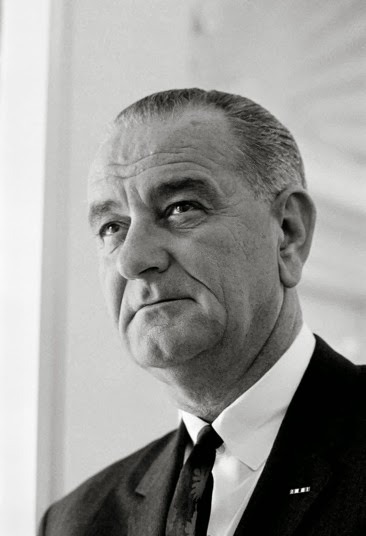
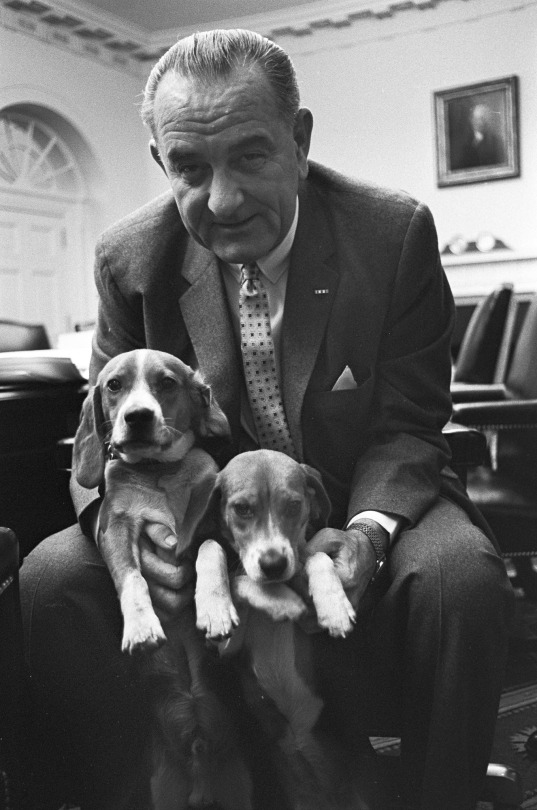

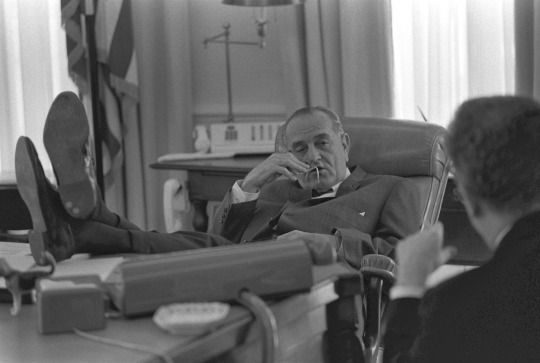

Tall, lanky and homely looking, during his administration he signed into law the Civil Rights Act (1964), the most comprehensive civil rights legislation since the Reconstruction era, initiated major social service programs, and bore the brunt of national opposition to his vast expansion of American involvement in the Vietnam War. He was also a philanderer of the highest order and a grade A dick, literally and figuratively, that is if you believe the rumors.
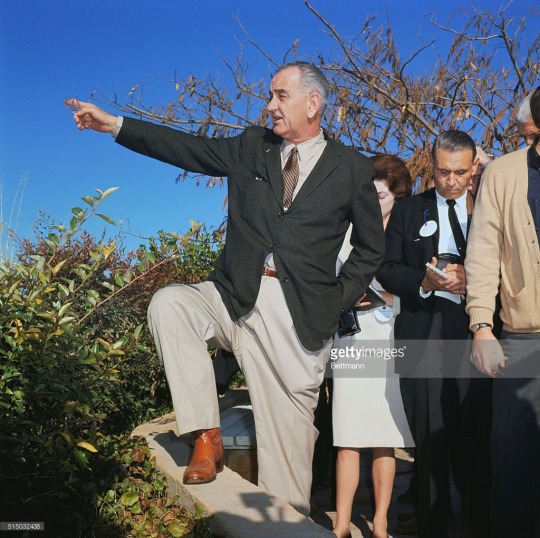
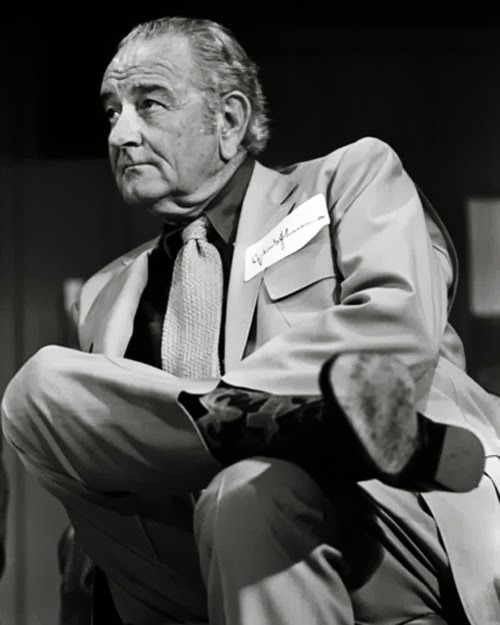
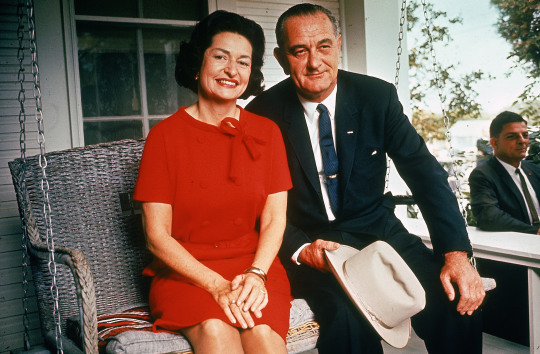
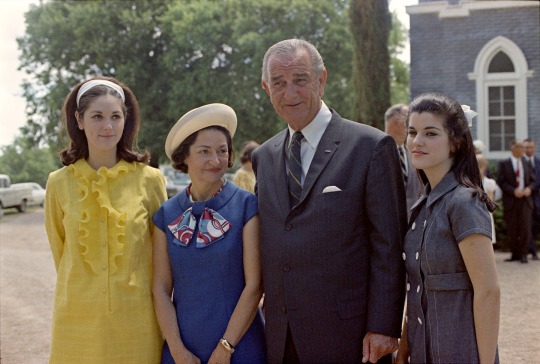

LBJ was married to Claudia Alta Taylor, known to her friends as "Lady Bird." The couple had two daughters. Throughout his life, LBJ’s extramarital affairs were anything but discrete. His wife, endured his behavior, with only occasional reprimands. LBJ has been referred to as a "giant" of a man, a description only his late wife Lady Bird (and dozens of other younger women) could verify. When swapping tales of womanizing with his fellow Senators, he would often brag about it, saying things like “Old Jumbo sure got a workout last night.” Now that's swagger.
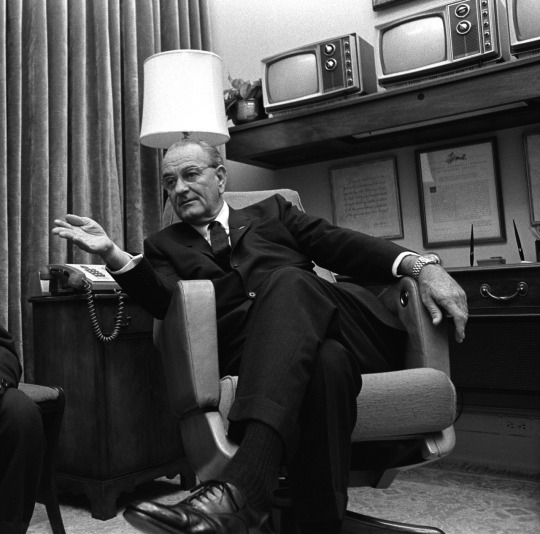
128 notes
·
View notes
Photo

47th Bomb Group A-20Bs at Youks-les-Bains airfield, Algeria, January 1943
169 notes
·
View notes
Text

US Vogue January 1, 1957
Christian Dior for Cole
vogue archive
#us vogue#january 1957#fashion 50s#spring/summer#printemps/été#christian dior#cole#swimsuit#maillot de bain#advertising#publicité
15 notes
·
View notes
Text


Yard workers walking the deck of USS FLORIDA (BB-30), at the New York Navy Yard.
Photographed on January 31, 1910.
George Bain Collection.
Library of Congress: Lot-10777-3, Lot-10777-4
#USS FLORIDA (BB-30)#USS FLORIDA#Florida Class#Dreadnought#Battleship#Warship#Ship#United States Navy#U.S. Navy#US Navy#USN#Navy#New York Shipbuilding Corporation#New York Ship#Camden#New Jersey#East Coast#Delaware River#construction#January#1910#my post
21 notes
·
View notes
Text

Henry Mancini w/ The Henry Mancini Orchestra - Peter Gunn Theme (1959) Henry Mancini from: "The Music from Peter Gunn" (LP) "Peter Gunn Theme" / "The Brothers Go to Mother's" (Single)
Instrumental | Theme Music
@𝐀𝐫𝐜𝐡𝐢𝐯𝐞 (left click = play) (320kbps)
Personnel: Henry Mancini: Conductor
The Henry Mancini Orchestra: Al Hendrickson: Guitar Bob Bain: Guitar
John Williams: Piano
Reeds: (Saxophones) Plas Johnson Ronnie Lang Ted Nash
French Horns: John Cave Vincent DeRosa John Graas Richard Perissi
Trombones: Milt Bernhart Kirk De Karske Jimmy Priddy
Trumpets: Frank Beach Pete Candoli Ray Linn Uan Rasey
Vibraphone: Victor Feldman
Rolly Bundock: Double Bass Jack Sperling: Drums
Arranged by Henry Mancini Produced by Simon Rady
Recorded: @ Radio Recorders in Hollywood, California USA August 26, 1958 - September 29, 1958
Album Released: January, 1959
Single Released: February, 1959
RCA Victor Records
6 notes
·
View notes
Text










Happy Birthday Scottish actor John (Hunter) Bell born 20th October 1997 in Paisley.
John got his first break in acting when he was eight years old through a Blue Peter competition to be in Doctor Who. He was a huge Doctor Who fan at the time and was doing drama classes, so when his parents heard about the competition, they entered him and he ended up winning. fellow Paisley actor David Tennant! And before anyone corrects me I know Tennant was born in Bathgate, but he moved to Paisley and was educated there!
Without that part in Doctor Who, John says he may not have pursued acting as a career. In fact, he nearly gave up on it altogether as a teenager.
In March 2008, he was the lead singing boy in a promotional trailer for the BBC 1 talent show ‘I’d Do Anything’, since then he has had some great acting roles, the most high profile must have been when he portrayed Bain, son of Bard the Bowman in two of the three epic Hobbit films. He also put in an appearance as Young Spud in T2 Trainspotting.
His TV work, for a 25 year old, is quite extensive, as well as Dr Who other shows have included Life of Riley, Tracey Beaker Returns, Hatfield & McCoys and Into the Badlands.
Of course young John is arguably most well known to the audience of the hit Starz show Outlander.
From season three onward he has been a recurring character, Jamie’s nephew, i.e “Young” Ian Murray, I enjoyed seeing him return to the fold, complete with Mohawk in the last season of the show.
In January 2022 John began his theatrical career in the a one-man show, The Night Larry Kramer Kissed Me at Wimbledons New Theatre. John commented at the time;
“It was an opportunity to play somebody gay, and I’d never done that before in my career, even though I am gay. On Outlander, I’m playing a straight character, a guy who’s very different to me, so it was nice".
In a recent interview John admited that 2 weeks before his Young Ian audition he was ready to give up acting. Opening up to Flip Your Wig, Bell explained: “I’ve been in acting since I was eight so I’ve done a lot of big things that have had huge impacts.
“But there was a moment in my career when I was about 16,17, when you’re trying to make that transition from a child to an adult actor, that I wasn’t getting any work.
“I thought I was going to have to give everything up.
“I was ready to go to university and do something else so Outlander came about two, three weeks before I was supposed to start university and I got the audition and I got it.”
According to his IMDb profile, Bell also has another project in the works called The Man In The Box, a drama currently in production.
28 notes
·
View notes